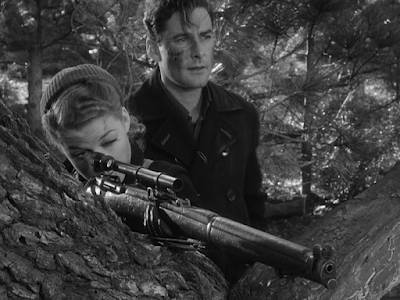Edge of Darkness (Lewis Milestone, 1943) A German reconnaissance plane flies over the occupied town of Trollness, Norway to find the unusual circumstance of a Norwegian flag flying over one of the buildings. The crew radios back to send a squad to find out why the expected Nazi flag of Germany isn't flying.
When troops are sent out, they find a town of corpses. They're everywhere—German and Norwegian alike—filling the streets, even going up to the Nazi commandant's office, where he still sits upright in his chair, dead. There has been a massacre and Trollness is deserted, save for one townsman, raving and extolling the Nazi's. He's clearly off his head, so they execute him without a second thought. So much for loyalty.
Being Nazi's, they probably wouldn't have spared his life even if they'd known his past. He was Kaspar Torgerson (Charles Dingle), the well-to-do owner of the town's cannery and their strongest supporter in town: as long as the Nazi's were in control and there were no conflicts, no danger of strikes, and the cannery kept running and he was making money, what could be the issue with them? And Torgerson would only be too happy to report one of his neighbors to the Nazi's as a troublemaker (which in the Nazis' view is "every man, woman, and child!"—and here I thought Nazi's discriminated)The thing is, most of those "troublemakers" are relatives of his. Oh, brother-in-law Dr. Martin Stensgard (Walter Huston) remains neutral—presumably to "do no harm"—and his wife, Anna (Ruth Gordon) is merely passive. It must skip a generation because one of the most ardent members of the underground is their daughter Karen (Ann Sheridan), who, with lover Gunnar Brogge (Errol Flynn), heads the Nazi resistance—there are 150 Nazi occupiers and over 800 villagers, but as the Nazi's say "we have guns and they are afraid to die"—so the villagers must wait until arms are delivered to them from English submarines—it is, after all, a fishing village and boats are going out all the time.Not that everybody is on board with the idea: Stensgard's son (John Beal), recently returned from university, is considered a Nazi sympathizer, and the town's priest (Richard Fraser) lectures from the pulpit about violence and God's judgment. And some folks, like the doctor, just don't want to get involved. But, if there is one thing Nazi's are good at, it's they can turn apathetic villagers to angry action. They're just like Frankenstein that way. It's the only thing they are good for.
Fairly soon, the arrogance turns to harassment then to rape and murder and even the most faint-hearted are soon flogging Nazis in the street, which allows the situation to escalate to horrific displays of aggression and violence that doesn't allow for any nuance of philosophy or conscientious objection...like any good piece of propaganda should. Made in 1943, it was a well-oiled agitprop by the studio that jumped on the war wagon first, Warner Bros. So, the performances are resolute and clear-eyed earnestness set against mustache-twisting villainy. Milestone, who'd started out in the silent era and who's All Quiet on the Western Front had won the Best Picture Oscar thirteen years earlier knows how to keep things moving quickly while not hesitating at outright manipulation to get the point across. Finish it off with Roosevelt's "Look to Norway" speech and you have a story that Americans can relate to, two years into the war effort.
Fairly soon, the arrogance turns to harassment then to rape and murder and even the most faint-hearted are soon flogging Nazis in the street, which allows the situation to escalate to horrific displays of aggression and violence that doesn't allow for any nuance of philosophy or conscientious objection...like any good piece of propaganda should. Made in 1943, it was a well-oiled agitprop by the studio that jumped on the war wagon first, Warner Bros. So, the performances are resolute and clear-eyed earnestness set against mustache-twisting villainy. Milestone, who'd started out in the silent era and who's All Quiet on the Western Front had won the Best Picture Oscar thirteen years earlier knows how to keep things moving quickly while not hesitating at outright manipulation to get the point across. Finish it off with Roosevelt's "Look to Norway" speech and you have a story that Americans can relate to, two years into the war effort.






















